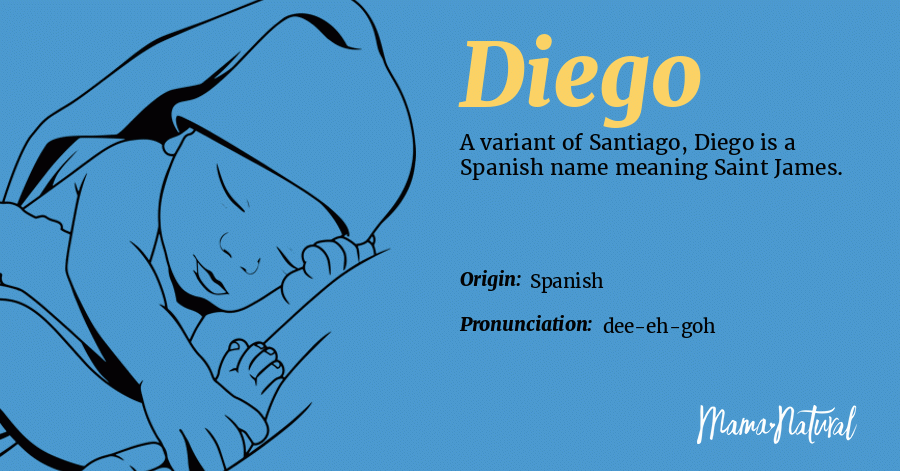Is San Diego a Mexican name?

Is San Diego a Spanish name
From Spanish San Diego (literally “Saint Diego”). Diego is a name on itself not a diminutive of anything as previously identified here as: Santiago (“Saint James”), ultimately cognate to English Jacob and English James.
CachedSimilar
Where does the name San Diego come from
Sighted in 1542 and named San Miguel by Spanish explorer Juan Rodríguez Cabrillo, the area was renamed for the Spanish monk San Diego de Alcalá de Henares in 1602 by Sebastián Vizcaíno.
CachedSimilar
What is the true meaning of San Diego
The name "San Diego" is Spanish in origin, and translates to "Saint James" in English. The city was named by Spanish exp.
What is San Diego real name
Discovered in 1542 by European explorer Juan Rodriguez Cabrillo, San Diego was originally named San Miguel and given its current name 60 years later, in 1602. European settlement began with the founding the first Catholic mission, Mission San Diego de Alcala, in 1769.
Cached
Is Diego a Spanish or Italian name
Spanish
Diego is a Spanish masculine given name. The Portuguese equivalent is Diogo.
What is the American version of Diego
James
So while it can be said (depending on which theory you believe) that Diego can be translated to English as James, it can also be seen as the equivalent of Jacob, Jake, and Jim. And in reverse, James can be translated to Spanish not only as Diego, but also as Iago, Jacobo, and Santiago.
How common is the name Diego in Mexico
Diego has become increasingly popular in the US since the early 2000s. It has become one of the top 100 boys' names and is currently ranked as the 62nd most popular boys' name in the US. It is also popular in other countries, such as Mexico, where it is the 15th most popular boys' name.
Is Diego Spanish or Mexican
Diego is a boy's name of Spanish origin. The meaning and etymology of this name is uncertain, but one theory states that it derives from Tiago, an abbreviation of Santiago, meaning “Saint Jacob.” Alternatively, it may derive from an Iberian name, Didacus, which was recorded as Diaco and Diago in the 10th century.
What is the meaning of Diego in Spanish
supplanter
The name Diego is a Spanish form of the English name James and has the same meaning, which is “supplanter”. It is also associated with the Spanish word for “Saint”, which is “Santo”.
Why does San Diego have a Spanish name
Spanish period
Arriving on his flagship San Diego, Vizcaíno surveyed the harbor and what are now Mission Bay and Point Loma and named the area for the Catholic Saint Didacus, a Spaniard more commonly known as San Diego de Alcalá.
Is San Diego a real last name
The San Diego family name was found in the USA between 1880 and 1920. The most San Diego families were found in USA in 1880. In 1880 there were 2 San Diego families living in California. This was 100% of all the recorded San Diego's in USA. California had the highest population of San Diego families in 1880.
What is the Spanish equivalent of Diego
So while it can be said (depending on which theory you believe) that Diego can be translated to English as James, it can also be seen as the equivalent of Jacob, Jake, and Jim. And in reverse, James can be translated to Spanish not only as Diego, but also as Iago, Jacobo, and Santiago.
Is Diego a Spanish or Mexican name
Spanish
Diego is a boy's name of Spanish origin. The meaning and etymology of this name is uncertain, but one theory states that it derives from Tiago, an abbreviation of Santiago, meaning “Saint Jacob.” Alternatively, it may derive from an Iberian name, Didacus, which was recorded as Diaco and Diago in the 10th century.
What is the female version of Diego
Diego is a boy's name. While you could choose to name your daughter Diego, it is very uncommon to do so. There aren't many versions of Diego that parents traditionally use for a girl, but there is one. Diego comes from the same base name as the French female name Jacques.
What is the most typical Mexican name
Sofía and Santiago are the most common baby names in Mexico, according to Mexico's National People Registry database.
What is the most common last name in Mexico
List of the most common surnames in Mexico:Hernández – 5,526,929.García – 4,129,360.Martínez – 3,886,887.González – 3,188,693.López – 3,148,024.Rodríguez – 2,744,179.Pérez – 2,746,468.Sánchez – 2,234,625.
What ethnicity was Diego
Diego is a Spanish masculine given name.
Was San Diego a part of Mexico
Mexico wins independence from Spain and San Diego comes under Mexican rule for about 25 years. First known home (today's Presidio Hills Golf Course golf shop) is built in Old Town. Mexican flag is raised over the Presidio. California swears allegiance to Mexico.
Why is San Diego Spanish
Upon landing in San Diego Bay in 1542, Juan Rodríguez Cabrillo claimed the area for Spain, forming the basis for the settlement of Alta California 200 years later. The Presidio and Mission San Diego de Alcalá, founded in 1769, formed the first European settlement in what is now California.
How much of San Diego is Hispanic
Table
| Population | |
|---|---|
| Native Hawaiian and Other Pacific Islander alone, percent(a) | 0.5% |
| Two or More Races, percent | 10.3% |
| Hispanic or Latino, percent(b) | 30.1% |
| White alone, not Hispanic or Latino, percent | 42.0% |
Is Diego an Italian or Spanish name
Spanish
Diego is a Spanish masculine given name. The Portuguese equivalent is Diogo.
What is a normal Mexican name
Mexican most common double names start with Juan, José, Luís and Miguel, the favorite combinations being Miguel Ángel, Juan Pablo, Juan Manuel, José Luís and José Miguel.
Is Diego Spanish or Italian
Spanish
Diego is a Spanish masculine given name. The Portuguese equivalent is Diogo.
What does Diego mean in the Bible
Diego means “teacher” (from ancient Greek “didakhḗ/δῐδᾰχή” = instruction/teaching) and “Saint James“ (from Santiago) or “may God protect”, “holder of the heel” and “supplanter” (from James or Jacob).
What is the most rarest Mexican name
What are rare Mexican namesGrimaldo: Meaning “powerful protector”.Balbino: Meaning “one who mumbles”.Facundo: Meaning “talkative” or “eloquent”.Mireya: Meaning “admired”.Abundio: Meaning “abundant”.Eloy: Meaning “chosen one”.Basilio: Meaning “noble” or “kingly”.Ramiro: Meaning “supreme judge”.



0 Comments